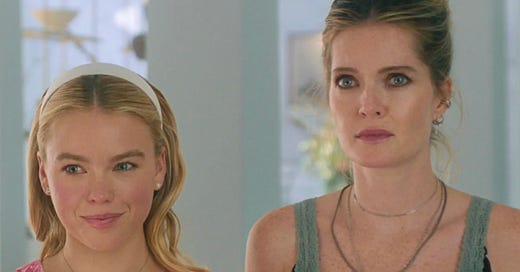The fab new Netflix TV series Sirens might be dark and creepy but psychologically it taps into age-old relationship themes that still haunt our subconscious today and make us act out: mother - father - daughter triangles, incest taboo, sibling rivalry, huge age gap marriages, infidelity and, for good measure, sexual addiction.
As the title of the penultimate chapter ‘Persephone’ hints, there is a deep Greek myth operating here in this modern story of wealth and power, so hold onto your mythological belts and hang on in there for a ride deep into your psyche.
I don’t know about you but after the finale I didn’t sleep much that night, especially as I’d just returned from running a psychotherapeutic dream retreat to the famous Persephone shrine at Elefsina, just outside of Athens, Greece. The series certainly taps into this millennia old story around which a huge cult sprang up, called the Eleusian Mysteries, based at the sanctuary at Elefsina, which dominated society and culture of the Ancient World for centuries.
If you’ve already watched the series you’ll note the cult theme and possibly like me you’ve binged watched episodes at a time, gripping on to your disintegrating psyche life-jacket – dragged to the rocks by the show’s siren-like qualities, cleverly embedded visually in the clothes, setting, structure and script.
So first off what is a siren? And who is the siren in this show? Usually, they are a dangerous half woman-half bird, living on a rocky island (if you’ve seen the series you’ll recognise all this straight off) who lure sailors to their destruction at sea with exquisite singing. Often people equate them with mermaids but they’re very different. Think bird, not fish.
It’s interesting that the sirens in this show alternate. Is it the Julianne Moore figure, Michaela Kell, Kiki to her friends, head of her own raptor bird sanctuary cult, and about to host the cult’s annual ritual – the society gala ball at her luxury island home? Or Meghann Fahy’s Devon with her sex addiction draw on men around her, including the captain of the family’s luxury yacht? Or the little girl figure, Simone, Devon’s sister, played by Milly Alcock, of `House of Dragon’ fame? Simone works zealously for Kiki to sustain her boss’s wealthy, modern day cultish lifestyle, but is also secretly wooing her loaded elder lover, the Kells’ next-door neighbour, while looking to get rid of her impoverished, unwanted sister who’s arrived on the island unannounced and looking to spill Simone’s family secrets.
And just to add to the customary tropes of a Greek drama we have the chorus, Michaela’s three obsessively devoted friends, or should that be worshippers, who repeat and sing out phrases scarily in unison, like demented, hypnotised beings. Very scary. Hey Hey…(you’ll get this when you’ve watched the show.)
In ancient times initiates into the Eleusian mysteries were sworn to secrecy. They were a mystery for a reason. Today in Sirens staff, friends and contacts have all had to sign the modern equivalent - an NDA.
So how does the myth of Persephone segue into all this? Persephone is a young girl who’s wrenched from her Mother, Demeter, Goddess of harvest and fertility, and is abducted by Hades, God of the Underworld – think Death. If you’re short of top billing gods then Zeus, Head of the Gods, is Persephone’s father.
Demeter goes crazy and calls on the sirens, her daughter’s companions, giving them wings, to search for her kidnapped child. Some stories have Demeter transforming the sirens into birds as punishment for failing to stop the girl’s abduction. Either way they are as doomed as is Persephone. (A possible nod to the eventual fate of Simone, the series Persephone figure, at the end of this drama.)
Now as queen of the underworld, ruling with her old husband over the souls of the dead, Persephone is only allowed to return to her goddess mother above ground during Spring and Summer, making this a cyclical fertility myth and the heart of the secret rites of the Old Mysteries cult.
The Demeter-Persephone, mother-daughter complex is as old as the ancient hills of Greece and is weirdly explored in the often queasy relationship between Kiki (Moore) and girly Simone (Alcock). The sharing of chewing gum is a disturbing moment which sums up the peculiar intimacy of their enmeshed relationship.
When does the mother-daughter invisible umbilical cord become mutually supportive rather than navigate dangerous depths? When is the mother a healthy role model influencing a daughter’s perceptions of self-identity, self-worth rather than obsessively controlling the child’s separate development?
These are subjects which regularly surface during my psychotherapy practice, and all of this is up for grabs between Moore as goddess and Alcock as devotee ‘daughter’ figure.
Then chuck in a few men into the sirens’ cult and watch the mother daughter complex swirl around like psychological eddies to navigate the inescapable male-female dynamics of power and desire. Kevin Bacon as Kiki’s wealthy husband, Peter Kell, is brilliant and can be viewed as a hapless drowning victim of the sirens, a sexual abusive Hades figure, or even as the all-powerful father Zeus.
All masculine-feminine projections lurk in the subtle script and story lines: Husband-wife and sexy young girl triangle. Father/daughter complexes, with an incest taboo undertone, the old man and young girl love interest.
Slutty sister’s, (Fahy’s Devon), untimely appearance on the scene makes her the drama’s good old fashioned catalyst figure for change, as well as introducing themes of adultery and sexual addition. This tired, washed-up siren battles co-dependency and the drama triangle tropes of being the rescuer of her dementia suffering father and ungrateful sister, victim of sacrificing her life to be her father’s carer, and aggressor by disturbing the Kell’s beautiful society event weekend. In the end she is the transformer transformed and we love her for it.
It's all a rip roaring, deeply disturbing, modern zizzing up of classic storylines. The Greek playwrights and audiences would have loved it.
ends




